#vales of anduin
Explore tagged Tumblr posts
Text
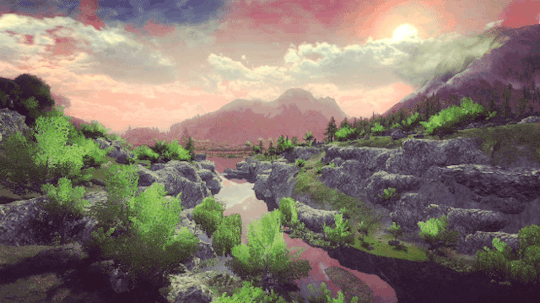
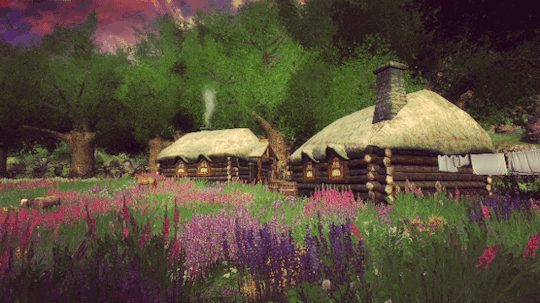
#lord of the rings online#lotro#lotr#my screenshots#vales of anduin#beorninghus#grimbeorn's house feels so cozy <3
31 notes
·
View notes
Text
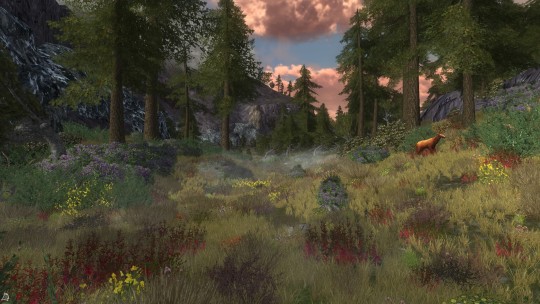
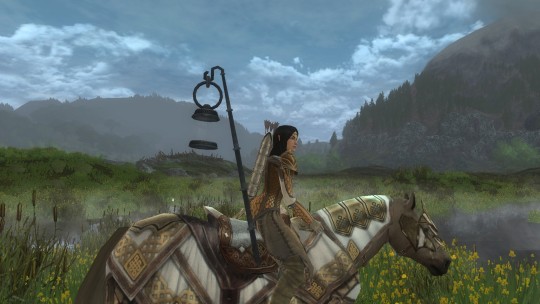
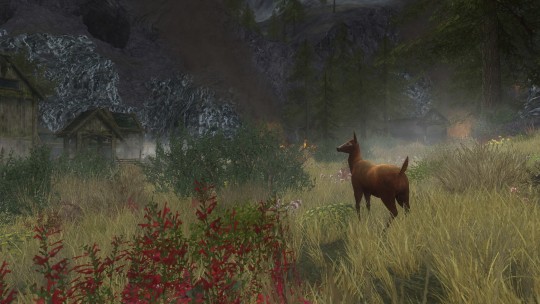
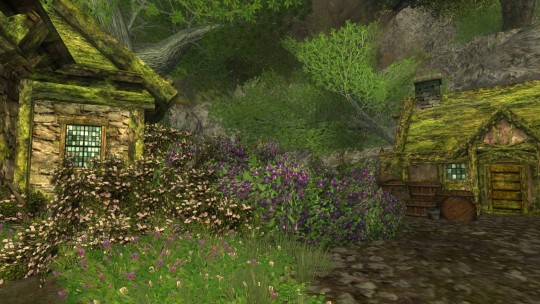
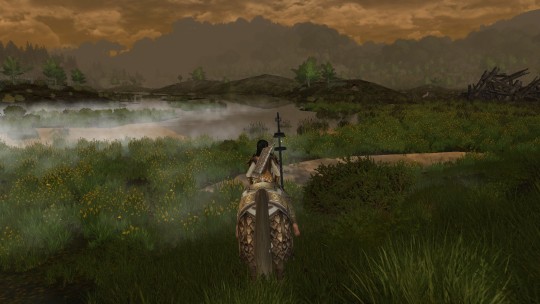
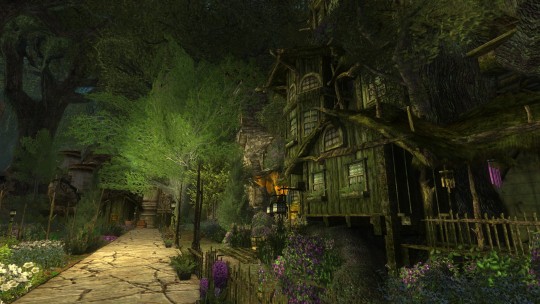
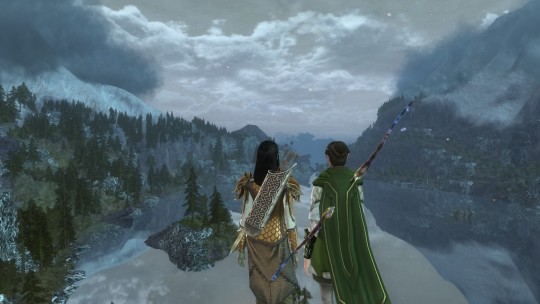
VALES VALES VALES VALES
24 notes
·
View notes
Text
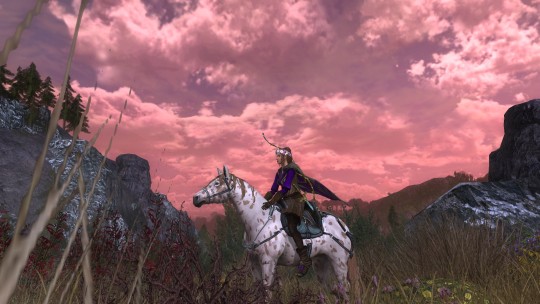
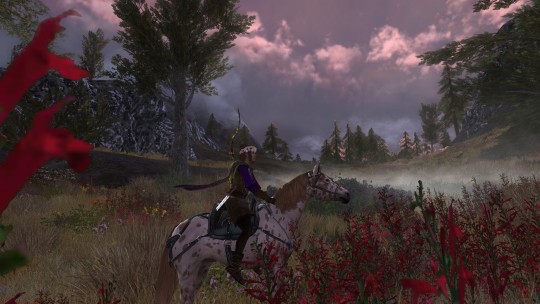
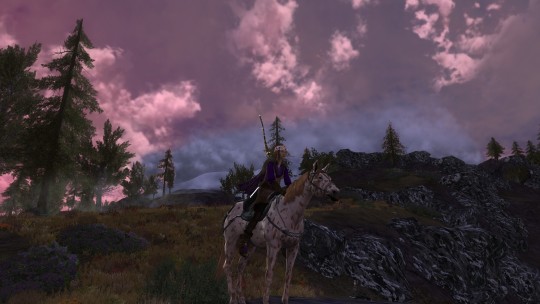
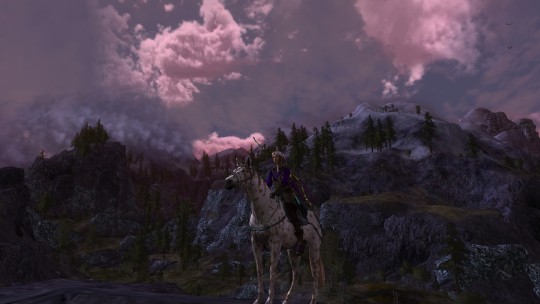
The Vales of Anduin are just so pretty, y'know? Like. The prettiest wildflowers north of Ithilien. And also some very dramatic skyscapes.
#lotro#lord of the rings online#cerphedis of gondor#vales of anduin#what i'm taking from this is that the anduin is really good at watering wildflowers
12 notes
·
View notes
Text
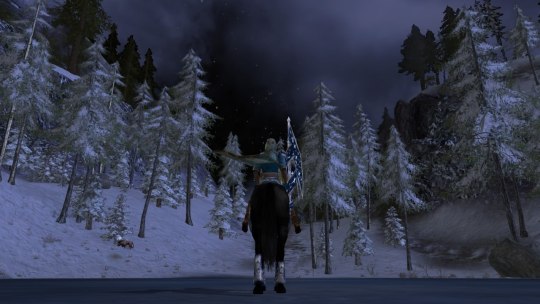
Finally found the entrance to the Vales of Anduin from the Misty Mountains. A goblin-town goblin proceeded to one shot me for what was 4x my morale. It was fun.
#that's what i get for being lvl 53 in a lvl 120 area#lotro#aeargail🌊#vales of anduin#misty mountains
3 notes
·
View notes
Text
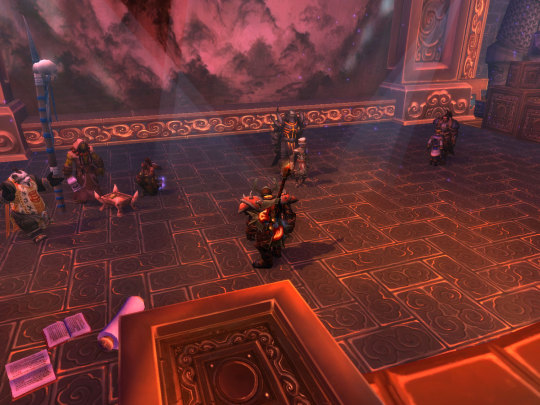
Parents of Warcraft, Vale of Eternal Blossoms, June 16, 2013.
#wow#world of warcraft#vale of eternal blossooms#mists of pandaria#gormorash#thrall#aggra#lorewalker cho#wrathion#deathwing#varian wrynn#anduin wrynn
9 notes
·
View notes
Note

For lotro geoguessr :)
oh that's the Vales of Anduin! looks liiiiiike... the northern more section, as I think I can see the dwarf bridge in Woodsedge off in the distance, so we must be near Meadhollow. based on how far away the bridge looks I'd say we have to be somewhere to the north-east ish of there? so maybe the road between Meadhollow and the Forest Gate, as that would also explain the signpost
#lotro geogussr#lotro#ask games#this one took me a minuet bc I *instantly* clocked Vales of Anduin but getting any more specific was tricky
7 notes
·
View notes
Text

chilling in the vales of the anduin somewhere
46 notes
·
View notes
Text
#tolkien#lord of the rings#lotr#silmarillion#stupid polls#middle earth#third age#for me#Bree-land#as a hobbit
35 notes
·
View notes
Text
Welcome to random Arda stuff:
I have decided to make a bunch of posts that explain some random Tolkien shit (ex. Elven names, Subgroups, Species in Arda, etc.) Masterlist Starting off with Elven subgroups:
Primary Division
When the Elves awoke by the waters of Cuiviénen, they were all one people. However, they were later divided based on whether they chose to follow the summons of the Valar to Aman (the Undying Lands):
Eldar: Those who accepted the summons of the Valar.
They undertook the Great Journey westward toward Aman.
Subdivided based on how far they traveled.
Avari: Those who refused the summons.
They remained in Middle-earth and never saw the light of the Two Trees.
The Avari fragmented into various groups, and little is explicitly detailed about them.
Eldar Division
The Eldar themselves were further divided during and after the Great Journey:
1. Vanyar
Characteristics:
The first and smallest group to undertake the journey.
Closest in loyalty and proximity to the Valar.
Known for their golden hair and great spiritual insight.
Deeply associated with the light of Aman and the Valar.
Status:
They remained in Aman and rarely appeared in later events in Middle-earth.
2. Noldor
Characteristics:
Renowned for their craft, knowledge, and thirst for learning.
Skilled in smithing, gem-making, and lore.
Often ambitious and passionate, which led to both great achievements and great tragedies.
Key Figures:
Fëanor, creator of the Silmarils, and his sons.
Finwë, Fingolfin, and Galadriel.
Status:
Many followed Fëanor in rebellion to Middle-earth to recover the Silmarils after the Darkening of Valinor.
Played a central role in the events of the First Age.
3. Teleri
Characteristics:
The largest and most diverse group, often associated with the sea and music.
Many of them lingered during the journey west and splintered into subgroups.
Key Subgroups:
Falmari: Those who reached Aman and became the Sea-Elves of Alqualondë.
Sindar: Those who stopped in Beleriand, led by Thingol.
Nandor: Those who turned aside into the Vales of Anduin, later becoming Silvan Elves.
Elves Who Stayed in Middle-earth
Not all Teleri completed the journey. These groups are collectively referred to as Úmanyar, or "Those Who Did Not Reach Aman."
1. Sindar (Grey Elves)
Characteristics:
Lived in Beleriand, ruled by Thingol and Melian in Doriath.
Culturally rich and highly influential despite never seeing Aman.
Known for their craftsmanship and connections to the natural world.
Key Figures:
Thingol (Elu Thingol) and Melian.
Status:
Played a prominent role in the events of the First Age.
2. Nandor
Characteristics:
A subgroup of Teleri who turned aside during the Great Journey to settle in the Vales of Anduin.
Known for their woodland lifestyles and simplicity.
Key Subgroups:
Laiquendi (Green-Elves): Those who moved to Ossiriand in Beleriand.
Silvan Elves: Descendants of the Nandor in regions like Mirkwood and Lothlórien.
3. Avari
Characteristics:
The "Refusers," who never began the journey west.
Fragmented into many tribes and cultures, often fading into obscurity.
Status:
Generally less developed culturally than the Eldar.
11 notes
·
View notes
Text
Elvers:
Masterlist
Eldar:
Vanyar:
About: The Vanyar are the smallest host of Eldar, and were all blessed by Manwe who gave them gifts of poetry and song. All Vanyar have + 2 when using their voice, for singing or convincing others and advantage on Intelligence. They prefer to fight with spears and have white banners in battle. They are residents of Oiolossë and Valimar. They speak Sindarin (common) and Quenya (the Vanyar dialect). If they were born in Valinor they glow in the dark meaning enemies might spot them.
Description: The Vanyar all have golden hair.
Noldor:
About: The Noldor is the second host of the Eldar. Noldor means those who know, showing their thirst for knowledge. They are known for being the most skillful of the Eldar hosts and were loved by Aule, whom they learned from. Their most known skills include developing their language, building castles and towns, gem cutting, and smithing. They are also infamously known as being the proudest of the Elvers. They have advantage in Intelligence and Wisdom. As a Noldor you can be devoted to any of the Valar except Namo. They favor swords and shields above other weapons. They are residents of Tirion, Formenos, Nevrast, Hithlum, Gondolin, Nargothrond, Dorhonion, All East Beleriand, and Lindon (all over Beleriand these are just the most known of). They speak Sindarin (common) and Quenya. If they were born in Valinor they glow in the dark meaning enemies might spot them.
Description: The Noldor are known for their black (dark) and a few times red hair, and grey eyes. They are about 7 feet tall.
Teleri:
About: The Teleri is the third and largest host of the Eldar who moved to Valinor. They are known for their fair voices, which they were once named after. They have advantage in Intelligence and Charisma. They are residents of Alqualondë, Isle of Balar, Ossiriand, Doriath, Tol Eressëa, and Mithlond. They speak Sindarin (common), Quenya, Telerin, and Nandorin. If they were born in Valinor they glow in the dark meaning enemies might spot them.
Description: They are known for their mostly silver, and at times dark, hair, and some were said to have skin so pale it was described as white.
Falmari (Sub-Race of the Teleri): The Falmari were the Teleri who took the Great Journey into Beleriand and reached Valinor, and are known for their ships. They are residents of Alqualondë and Tol Eressëa. They speak Sindarin (common), Quenya, and Telerin.
Sindar (Sub-Race of the Teleri): The Sindar, also known as the grey Elvers are good singers, woodsmen, and shipbuilders. Their hair is usually dark. They are residents in Doriath, the Falas, and Nan Elmoth (all over Beleriand these are just the most known of). They speak Sindarin (common).
Nandor (Sub-Race of the Teleri): The Nandor is the Teleri who turned aside from the Great Journey to the Misty Mountains, they are described as having white skin, and dark or brown hair, and are great lovers of nature and animals in the dark and deep forests, and are a very secretive folk. They are called green Elvers. They are farmers out from their name Nandor which means farmer. They are residents of Lothlórien, as the first people there, Greenwood the Great (although that´s first mentioned in the second age, they where the first residents there so they probably where there in the first age too), Belfalas, Ithilien, might have been the first there, and Ethir Anduin, as the first people there. They speak Sindarin (common), Silvan Elvish, and Nandorin (their own language). If you play as a Nandor you automatically have an Elven Cloak (a cloak that can blend into any form of environment and gives you +3 on stealth).
Silvan (Sub-Race of the Nando): Silvan, also known as wood Elvers, are rivals to Dwarves, and descending of the Nandor who choose to live in the Vales of Anduin. They are residents of Lothlórien, Ithilien, Edhellond, Greenwood the Great, and Belfalas. They speak Sindarin (common) and Silvan Elvish (their own langue). If you play as a Silvan you automatically have an Elven Cloak (a cloak that can blend into any form of environment and gives you +3 on stealth).
Avari (Moriquendi):
About: The Avari, or unwilling according to the Vanyar and Noldor, where the Elvers who refused to take the great journey. Some of them are said to know dark magic (following the letters and drafts it´s either song or rune magic (you can choose only one if playing an Avari)) and others where said to be corrupted by Morgoth or having turned savage in the wild, and their biggest rivals are said to be the Eldar. What is known about them is that they lived in tribes with unique and private cultures and rituals, some big others small, consisting of usually family, although only six tribes are mentioned; Kindi, Cuind, Hwenti, Windan, Kinn-lai, Penni. They are residents of Eriador, Rhûn, Taur-Im-Duinath, and the Vales of Anduin. They speak Sindarin (common) and various Avarin languages (their own languages).
Description: Nothing is said about how they look.
Pros: They have advantage in Dexterity, Constitution, history, and arcane rolls. They have darkvision and can´t get sick, they are also immune to the spell sickness unless it´s a powerful Ainur who cast it.Cons: A lot of other races can be hostile against them, they are also hostile to each other, and a lot of the time won't want to make alliances. Elvers are also all stubborn, and usually convinced they are the only ones who are right. All Elvers take a quarter more damage in psychic attacks than other races.
#tolkien#jrr tolkien#silmarillion#vanyar#noldor#teleri#falmari#sindar#nandor#silvan#avari#moriquendi#silmarillion d&d
23 notes
·
View notes
Text

A Sweet Surprise
An On Swift Wings one-shot set post-war, a nice little palate cleanser for you to enjoy ❤️
“So where, exactly, are you taking me?”
Rhosynel’s curiosity earnt her an amused glance from Boromir, her arm looped through his as the pair strolled through the streets of Minas Tirith. With spring starting to come to a close, the weather was warming up and the citizens of the city were making the most of it. Stalls were popping up, markets were beginning to bustle, and the scars of war were beginning to fade.
True, there was still reconstruction to be done, but the city was healing.
“I did say it was a surprise,” Boromir replied, glancing to her with a fond expression, “are you really that impatient? Do you have somewhere to be?”
“You know full well I don’t, considering you booked today in my schedule.”
He’d claimed this day over a month ago, the schedule of meetings and plans for the improved Messengers Service had been taking up hours and days and weeks of Rhosynel’s time. There were outposts that needed construction, stables that needed to be financed, and more Messengers that needed to be trained, not to mention the roads needed to be repaired or improved. Or built.
As such, when she wasn’t drowning in paperwork, she’d been run ragged, constantly hustling back and forth, be it in Gondor, Arnor, Harondor, or even north to the Vales of Anduin. True it was exciting and thrilling, not to mention her new and improved rank of Kings Messenger gave Rhosynel even more freedom and autonomy, but by Béma’s Bow she was exhausted.
“You’ll enjoy it, I promise,” Boromir attempted to reassure, “I did say I’d treat you.”
Somehow, Rhosynel didn’t doubt that.
Pausing, the pair let a cart stacked high with barrels being hauled by a donkey cross their paths, the owner of said cart nodding to Boromir as the wheels bumped and rattled on by. Even out of uniform, even not wearing any crests or motifs, Boromir was more than recognisable and respected.
It was a relief that her face wasn’t yet remarkable.
“Not far now,” he added, as they resumed walking.
“Good, I’m getting hungry and we’re missing lunch for this.”
It wasn’t a complaint, not really, Rhosynel was far too accustomed to going for days without food, an hour or two wouldn’t make a difference. Especially considering how pleasant the day was, their stroll leisurely and unhurried, cheerful chatter and friendly greetings filled the market of the fourth level, it was warm and comforting to see just how the city was recovering.
“Ah, here we go.”
At Boromir’s words, Rhosynel’s attention pulled away from the stalls of jewellery, leather work, books, flowers, and trinkets, to find that Boromir was heading towards a specific building at one side of the market.
A bright blue awning had been erected over the front door and window of the shop, adding more outside space to display their wares. The wooden table was covered with a white tablecloth, and atop it, arranged beautifully, were all manner of treats both sweet and savoury.
Breads by the dozens were piled high, brown, white, seedy, flat, long, square, fluffy, dense, raisins, fruit, and more all competed for Rhosynel’s attention. Cake upon cake was arranged in vibrant colours, one layer, two, three, even possibly four layers tall, with thick cream spread between then topped with even more, drizzled with icing and decorated with sugared fruits from across Arda. And then there were the pastries, with golden flaky surfaces, everything from herbed duck to slow cooked pork, or sweeter options like cream and sugar dusted parcels of layered pastry with fruit fillings.
Rhosynel’s mouth immediately started watering.
“Lord Boromir!” the stall keeper was greeting in clear familiarity, her face brightening into a genuine smile as the pair approached, “welcome back.”
“Good afternoon, Miss Tawardil,” he greeted warmly, “business is going well today I take it?”
His gesture to the stall drew Rhosynel’s attention back down to the delightful display of delicate desserts, but also the notable gaps where products had sold. True they were few and far between, but the fact there were gaps at all was impressive, considering the bakery was still active and churning out yet more food.
“Indeed, but I set aside a couple of your favourites to keep warm,” Tawardil replied.
Favourites? Just how often did Boromir visit this bakery?
The woman was already bustling into the building, her flour dusted apron whisking out of sight, and Rhosynel turned an amused look to him.
“What?” Boromir asked, grinning back at her. “The stuffed pastries they sell here are delicious, I always stop by when I’m passing through.”
“Well since you’re so familiar, what would you recommend?” she asked, her own smile broadening.
“If you fancy something savoury, then the duck and orange pastry, or if you’d rather a sweet treat, then the lemon curd is my favourite.”
The swiftness with which he answered drew a laugh from Rhosynel, shaking her head in disbelief. But squeezing affectionately with her arm threaded through his, she turned her gaze back to the staggering arrangement of baked goods on display.
It would be hard to choose, but Rhosynel had an inkling of what she’d get.
“Here you go my Lord,” Tawardil reappeared with a paper wrapped parcel.
“Ah thank you indeed!”
The baker’s attention was already turning to Rhosynel with a broad smile. “You’re in luck, Rhosynel, I have a few of the cocoa and cinnamon swirls left, but you should have let me know you were coming, I’d have kept them warm for you!”
Rhosynel could have sworn she heard the click of Boromir’s neck, as his head snapped about to stare at her.
“I didn’t know I was coming, it was a surprise,” she replied, still smiling even as a flush began to creep up her neck at the intensity of Boromir’s gaze. “But yes, a cinnamon swirl would be lovely, thank you.”
A second wrapped parcel joined the first, and a handful of silver gratefully given.
It was almost impressive how Boromir managed to remain quiet until after they left the stall and the marvellous display of goods. The wrapped pastries in his hands, and her arm threaded through his as they ambled away.
At which point he spoke up.
“You absolute little—”
“I didn’t know that it was Tawar’s you were taking me to!” Rhosynel protested quickly before he could get much further. “It was a surprise!”
There was a grumble from the Lord on her arm, and she promptly steered him towards one side of the market, a low wall was in the sun and somewhat quieter than the hustle and bustle of the crowds milling about. A good place to settle and people watch.
“It was a good surprise though,” she continued, “I haven’t visited the bakery for at least a month, I was getting cravings for another cinnamon swirl.”
There was another grumble.
Hopping up onto the wall, Rhosynel reached out, catching Boromir’s arms and drawing him towards her. With her perch, she was for once slightly taller, and it made a nice change for him to be the one peering up at her as Boromir settled between her knees.
There was a scowl on his face, but she could see the twitch of his lips trying to hold back a smirk.
“Really though,” Rhosynel pressed on, “I didn’t know you were a patron of Tawar’s?”
“We’ve not exactly spent much time wondering the city together,” he pointed out.
“Then we’ll have to change that, make a date out of it. There’s a particular tavern in the lower level that sells the best ale.”
“If it’s the Twisted Latch then I’m already familiar, I’ve had to drag my men out of there on more than on occasion,” he retorted, and neatly scuppered Rhosynel’s plan. “Or is that the sort of place you make a habit of visiting?”
“Only when I’m getting the soldiers drunk to annoy you.”
The startled bark of laughter from Boromir was enough to banish the rest of his faux glower, and he shook his head ruefully. “Fine, fine. Eat your pastry and let me wallow.”
“No,” Rhosynel said sweetly, and pecked a kiss to his forehead –purely for the novelty of being taller– before plucking her pastry from his hand. “Where else do you frequent then? And don’t say the barracks.”
“The training grounds.”
Rhosynel would have swatted him on the arm if it weren’t for the fact she was halfway through unwrapping her pastry. The tantalizing scent of sweet cocoa cream and the subtle spice of cinnamon was one she’d not smelt in months. Her mouth was watering, and even licking the sugary dust from her fingers was enough to distract her from reprimanding Boromir for his sarcasm. The two key ingredients were imported from Harad, but with the War on, the supply had dwindled, and they’d become worth their weight in gold, it was a relief to have her favourite treat again after so long.
“How about,” he was saying, chewing his own pastry in deep thought, “the gardens on the third level, the roses there are some of the sweetest I’ve ever smelt.”
“Sounds nice, we could take a picnic.”
“Load up on pastries on our way down to them?”
“Maybe in summer when it’s a little warmer?” Rhosynel added.
There was a soft chuckle from Boromir, shaking his head and neatly dusting his deep burgundy doublet with powdered sugar, automatically she was reaching out to brush it free from the fine silk before it could stick.
“You are always cold,” he said with a fond smile, “but yes, if you want, we can wait till summer, although that’s a long way off.”
“A week or two, you mean,” she countered, holding up one hand to cover her mouth as she spoke around a mouthful of cocoa.
“Don’t talk with your mouth full.”
“Fwuk uff.”
That earnt a snort.
“Alright, in two weeks we’re going for a picnic, so you better not be halfway to Erebor by then,” he said, with a nod, as though it was that easy to settle on a date when they were both free.
“Fine, but if he wants to argue you’re telling Aragorn that I’m ‘indisposed’ that day, since this is your idea.”
“He won’t argue if he knows what’s good for him.”
Rhosynel swatted at his chest in mock horror. “Don’t be rude, that’s the King you speak of!”
All too easily, Boromir caught her offending hand in his, already rising it to his lips to lick up some of the flakes of pastry and cinnamon sugar that had stuck to her fingers.
It was an entirely far too intimate act for such a public place, and as Rhosynel turned scarlet with the heat of a hundred suns. Although, if she were to judge by his sly grin of triumph, she suspected he’d done that entirely because he knew how red and speechless she’d become.
Thankfully Rhosynel was rarely short on words.
“If you get to steal some of my pastry, it’s only fair I get some of yours,” she objected, face still hot.
There was no hesitation from Boromir, holding it up to her lips in clear offer. Fully expecting him to snatch it away before she could get a bite, she all but lunged at the offering, taking a far too large a portion of the lemon curd filled pastry. The sweet and sharp preserve was tangy, almost grimacingly so, but the sugared flakes of pastry settled it to just tart. It was nice, she had to admit.
“Whoa hey now!” Boromir exclaimed, having nearly lost a finger in the process. “What happened to some!”
“Wha’ y’gonna do bou’ it?” Rhosynel challenged through a very full mouth.
Boromir lunged.
A shriek left her mouth –slightly muffled– as Rhosynel lurched back, his teeth snapping shut on her own cinnamon swirl. She’d have toppled backwards off the wall, if it wasn’t for the fact Boromir had moved quicker and gotten his free arm about her back. So instead of toppling, she yelled, flailed, hooked her legs about his waist in a panic, and generally made a scene, drawing a few chuckles or confused glances from those passing by.
“I’ll do that.” The Warden of the White Tower looked like a smug teenager, grinning with a mouthful of pastry, and his arm securely anchored about her back.
Swallowing the lump of lemon and pastry, Rhosynel mock lunged for his again, and the grip about her waist tightened to pull her flush against his chest. Now pinned against him, Boromir simply held his arm up, so she couldn’t reach. It was true that the wall she’d perched on gave her a height advantage, but Boromir’s arms were outlandishly long, and the sweet dessert was now entirely out of reach.
“Cheat!”
“I’m defending what’s mine!”
It was incredibly tempting to bite him in retaliation, but that was a little too much for a public space even by her standards. So instead Rhosynel very maturely crammed as much of her cinnamon swirl into her mouth as physically possible so he couldn’t steal any more of it from under her nose.
“That is horrifying.” He sounded almost proud, watching her aggressively chew.
She grinned at him.
“But, while you’re unable to speak, I must admit to an ulterior motive, with this date,” Boromir continued, and Rhosynel abruptly found herself feeling mildly alarmed as to what this was entailing. “I’ve been thinking about my apartments, and while it suits me quite well, its starting to feel a little… cramped now that you’re leaving your own work scattered all over the place.”
Rhosynel managed to anxiously swallow half her mouthful, unable to decide if she was worried as to what he was going to say, or curious as to what he was leading up to. Had she been too messy? Was he annoyed that her paperwork and belongings had scattered across his once spotless quarters?
But Boromir was inhaling deeply. “So I was thinking of moving to a larger set of rooms, and whether or not… you’d like to move in with me?”
That, was not what she’d expected.
Choking down the last mouthful of cinnamon, Rhosynel tried to marshal her thoughts, but all she managed was a stunned, “what…?”
“I know you’ve got your own apartment,” he hastened to continue, clearly taking her shock for discomfort, “but you spend just as much time up in the Citadel and I figured it would be easier if you had your own study and space within rather than having to traipse back and forth at all hours after your meetings not to mention its closer to the stables so you’d get back quicker after your missive ru—”
Boromir was silenced as Rhosynel kissed him. True it was only fleeting, and she was quick to lean back and watch the expression on his face as she answered. “I’d love to.”
It was his turn to look stunned, going to far as to blink several times as though trying to understand that it was that simple.
“What…?”
“I said yes, dear.”
“I-I know, but, are you sure? You didn’t exactly take time to consider it,” Boromir replied.
“I don’t need to consider it.”
“But surely…”
“Boromir,” Rhosynel sighed, one part exasperation, one part fondness. “You said it yourself, I already spend so much time up at the Citadel, and within your quarters, it makes sense. But Boromir, you should have said that my mess bothered you.”
“It doesn’t.”
The response came so swiftly that Rhosynel knew he was telling the truth.
“Are you sure?” he pressed, despite the fact she’d already confirmed as such. “If you want to take some time to think about it—”
Rhosynel kissed him again, lingering this time. “I’m sure,” she murmured quietly, “I’d love to move in with you.”
There was a shaky exhale against her lips, and Boromir’s free hand rose to cup her jaw, silver and grey eyes searching hers as though looking of any hesitation or doubt.
“Very well then,” he said, voice soft and breath ghosting across her skin. Against her lips, Rhosynel felt the moment Boromir started smiling. “I guess I’ll have to get used to sharing with you.”
“You can start with that pastry.”
“I take it back.”
Rhosynel laughed, kissing him again, the sweet taste of sugar on her tongue. “You love me really.”
“That, I do.”
#On Swift Wings#A Sweet Surprise#Lotr fanfic#lotr fanfiction#lotr oneshot#boromir x oc#fotfics#moth fic
6 notes
·
View notes
Text
Steelsheen - Epilogue
Based on Tolkien’s writings, not the film trilogy. Gap-filler; Canon-compliant; But I do have complaints about certain Tolkien settings, so I'll just fill in the gaps my way.
Main Character/POV: Éowyn Rating: Teen (PG-13)
Previous: Chapter 10. Estel, Necestel
Epilogue. Steelsheen
Of the great battle of that age, the War that changed the world, many songs were sung, and many tales told. One of them spoke of Éowyn, daughter of Éomund and Théodwyn, who rode in secret guise beneath the name Dernhelm to the field of battle, and there, with the aid of a Halfling out of a far land, struck down a foe no man could withstand. Thereafter she was known as the Lady of the Shield-arm in the Riddermark, and her tale lived long in the mouths of men.
The world, though scarred, endured. And in its quiet turning, there came a season not only of rebuilding, but of remembrance—of wounds that showed, and wounds that lay hidden deep; of names nearly forgotten, and of fires that, once kindled, never wholly die.
In the first spring after the fall of the Shadow, Éowyn departed from her new home in Emyn Arnen and crossed the Great River at Harlond, journeying westward. Her road led to Lossarnach, the vales of flowers. She spoke of her errand to none but Faramir, who knew well the tale of her grandmother, and the legacy she had reclaimed. He offered to ride with her, but she declined, deeming the quest her own.
The road lay open now, green once more, and the orchards of the vales bloomed with promise. The air was rich with the scent of new earth and old memory, and the wind stirred softly through birch and ash.
“One day we shall ride again, to lands your eyes have not yet beheld, and come to know those you may yet hold dear.” She thought then of her cousin’s words, and answered in her heart: I have done so, brother. I only wish you were here, to see what I behold.
She bore with her two letters—the last she had not read ere the war: one, formal and sealed, affirming a claim to a small holding in Imloth Melui, granted in the final year of Thengel, King of Rohan. The other was from Finduilas, wife of the late Steward—indeed, Faramir’s mother—written with grace and marked by sorrow; it spoke of a promise kept, a final wish fulfilled, and the aid she had given Morwen in securing the Steward’s assent.
So she came at last to a hillside where flowers grew wild and free: a modest cottage, half-veiled in vine, with white lilies bowing beside a low stone wall. Far below, the two rivers—Erui and the great Anduin—glimmered in silver threads, winding through the folded land, past groves of olive and ash. It was a place unmarked on any map, unnamed in song—yet in that hour, it seemed not newly found, but remembered.
No one was there; indeed, the cottage seemed long abandoned, as she had expected. She dismounted, and bade her horse wait.
Beyond the garden, where tall grass met the wood’s edge, she found it: a cairn of river-stones, veiled in ivy, set apart in the hush of wild blossoms. No name was carved. No boast, no sigil. Only the stillness that followed when a tale was ended, and the world had no further need of remembrance.
For a long time she stood in silence, the wind stirring her cloak, the scent of earth and rose about her. Then she knelt, and laid her hand upon the stone.
She had not come to mourn—for grief, fierce and scalding, had passed through her long ago. Nor had she come to honour the dead with lofty words. She had come to see that her grandmother had found what she herself had once sought: not renown, nor escape, nor even love—but rest, in the place where her heart had ever dwelt.
Éowyn had seen war—its fire, its terror, its reckoning. She had fought, in the depth of her despair, to defend what she could not bear to forfeit. Her blade had been her voice, when none would heed her words. But war was not her calling—it had been her answer.
And when the dust had settled, and the world turned once more toward peace, she understood at last: her will to fight had been born not of pride, nor of ambition, but of fear—fear of powerlessness, of watching others suffer, and being unable to lift a hand to stay it. She had never longed to slay, but to shield; to preserve; to mend what had been torn.
And in the slow unmaking of her uncle, and in her grandmother’s written words, she had glimpsed what few would name: that healing was no lesser strength, but the rarer. That her people, bold though they were, had yet to learn how to tend wounds that did not bleed. That the hands of a healer might carry as heavy a burden as those that bore the sword.
She brought no garland. But she brought a chisel, and the strength of her hand.
She cleared the stone, brushing away time and ivy. Then, with slow and measured strokes, she carved a name—not in flourish, but in the ancient runes of the Rohirrim, grave and enduring. Not the name sung in mead-halls, nor the name spoken in the courts of kings, but the name that had withstood the years:
Steelsheen
When the carving was done, she set aside the tool and laid her palm upon the stone. The stillness that settled over her was not emptiness, but peace—deep and unwavering, like the hush that follows a storm.
For in that moment she knew, with an inexplicable certainty: her grandmother had chosen the hour and place of her passing—not as retreat, but as resolve, in the manner of the Men of old. As one who had walked a long road, and at last laid down her burden—not in defeat, but in dignity.
And Éowyn, too, had chosen.
She had not turned from war out of weariness, nor taken up the healing arts to be spared the blade. She had faced the shadow and passed through it. She had looked into the abyss—and risen above. And now she turned to the work most needed, and least sung: a labour no less demanding. She had learned swiftly to tend wounds of battle in the Houses of Healing, but herblore and leechcraft, alas, would ask much of her—effort, patience, and long years of toil, like the art of cookery, as Faramir had gently told her.
She rose, and the wind stirred the grass about her. When she turned to go, she did not look back. Yet her hand lingered a moment upon the old gate-post, roughened by weather and worn by time.
Then she mounted, and rode on—back to where she had come.
And in the turning of the world, her name was not lost—nor the name she carved, which weathered time, and outlasted stone.
-The End-
AO3 link to full story
@konartiste no pressure tag :)
#lord of the rings#eowyn#theodred#eomer#theoden#morwen steelsheen#original character#ao3 fanfic#fanfiction#fanfic#lotr fanfic#rohirrim
3 notes
·
View notes
Text
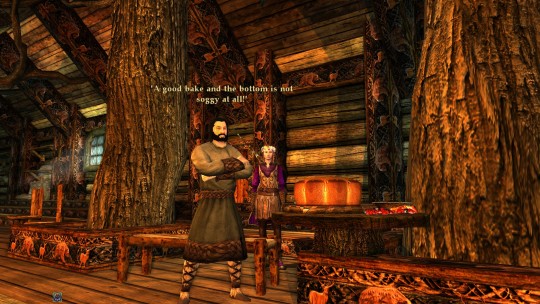
First place in the Great Beorning Bake-Off? XD :-D
6 notes
·
View notes
Text
Unforsaken, 9c
(All sections on tumblr)
(AO3, lagging behind but more polished)
Elrohir asks if Maglor ever wandered far enough south to get completely clear of Sauron's shadow.
Celegorm asks if he would have noticed if he did.
Maglor says yes, as a matter of fact, he did travel that far a few times and did notice.
In fact, he's been farther south than the Númenóreans ever got! Although it was a little hard to tell, since stories of the wicked Westerlings spread south, too.
…Then they have to explain 'Númenóreans (derogatory)' to the Hirnedhrim.
"Have you not heard of this at all? I thought the Dunlendings were still holding grudges about it?"
"Not that anyone told us about."
Risyind mentions that apparently Pelndoru either wasn't paying enough attention to hear about the Númenóreans or else it decided to scrub them from history after the Involution. She's guessing the first one.
(If she didn't have more important things to worry about Sharlinnu would definitely be cranky about the Involution.)
****
Gimli points out they should probably do a demonstration with the Wizard's Clay before it comes time to use it.
…Although the horses wouldn't be very happy about it. Or the oxen. Or Celeborn.
Maglor could probably keep it from bothering the oxen and horses? It's not easy when he doesn't know beforehand what he needs to neutralize…
Celeborn objects to blowing up anything in the Vales of Anduin regardless of who can hear it — though he can see the point about needing a demonstration. Wait until they're north of the mountains?
Okay, but at that point Maglor will also need to keep it from attracting cold-drakes.
…Actually no one knows whether cold-drakes would come towards the sounds of explosions.
****
Over the course of several days—
Ah, geese flying north.
They're doing a lot of landing and taking off for migrators.
…They really should have overtaken us by now.
Are we being tailed by geese?
Gimli was bitten by a goose once.
That's nothing, a couple of the goblin-men of Dunland got mauled by geese, they eventually swore off trying to keep them.
…None of the elves have ever been attacked by geese.
"It's about respecting them."
…Those are… kind of large for geese, actually, aren't they?
Ohhhhhh, those are the Geese of Manwë!
Everyone stops to look at Glorfindel like he's lost his mind.
The what now.
The Geese of Manwë. Like the Eagles of Manwë, but geese.
…
We didn't see them in Eldamar in the Time of the Trees because there weren't a lot of natural bodies of water — apart from the Sea — but once we got rivers in—
What.
—No, one thing at a time, geese.
(Or should it be Geese?)
Glorfindel isn't sure what they want him to say. They're like Eagles, but geese. They aren't as suited to killing things as the Eagles. Their homes are less remote, so you see them more often, in the West. Some of them enter poetry competitions? They're supposed to be banned from both Yavanna's gardens and Aulë's workshops, but, uh, that hasn't really stuck.
"None of that explains why they're following us."
"I… expect they're meant to be helping us?" Glorfindel says. "I'm not sure how, but it must be a good sign?"
"I would have thought Eagles would be more help," Turgon says. "Although I suppose they could arrive later."
Has this flock been living somewhere in Middle-earth all this time? Who knows!
"Those aren't all geese," Legolas says suddenly. "There are two swans. Grey, but swans."
Celegorm immediately turns around and tries to look himself, even though it is a sunny day and he was uncomfortable even before looking at the sky. He is unable to confirm or dispute Legolas's observation.
Several others can confirm it, though.
…Huh. Weird.
…Not really much weirder than the 'there are Geese of Manwë' baseline, though.
****
(That evening after speaking to the party Arwen decides to take a closer look at these 'Geese of Manwë' and mystery swans. She ends up dropping the Orthanc-stone on her foot. It fractures a toe. Arwen swears Aragorn to secrecy.)
****
They're able to keep on the river a long ways, with all the oxen walking and the barges lightly loaded — even past the point where the Anduin is born in the confluence of two smaller rivers. They pick the tributary coming down from the Misty Mountains, since the one from the Grey Mountains splits into two streams halfway there.
It gets un-navigable eventually, but Celeborn doesn't think it's more than a day or two before they would have had to cut north away from the river anyway.
They unload the wagons from the barges, and move the supplies to the wagons. As for the barges themselves — well, they aren't anticipating any cargo on the way back, but it would still make things easier, and they should at least try to return the barges to Arwen. They drag the barges on shore and turn them over, protecting them as much as they can out in the open.
They reorganize the oxen — eight wagons rather than four barges — and continue on.
****
At this point they can all drive the wagons. No one is particularly eager to. (The suspension is not great.) They trade off often.
Celegorm, Turgon, and Sharlinnu have to pick between walking in the daylight, riding in the wagons, or walking around holding a piece of canvas over their heads as a sunshield.
Caution rises as they approach the Gap of Gundabad — not that they weren't alert before, but there hadn't been any expectation of threat.
Gimli grumbles about such a holy place being profaned.
Khitwê points out that Pelnûru scholars' best guess at the former location of Kuynennu — Cuiviénen — is in Dead Empire territory, and even the geography isn't there anymore, so really the dwarves are still ahead!
Elladan: "I thought no one knew where Cuiviénen used to be!"
Khitwê: "They don't know for sure, but there were people who knew how to get to Kuynennu from Pelndoru and back, so even after everything got torn up they could get approximately there…"
Of course they couldn't investigate after the White Empire started up.
Maglor: "…So if Mount Gundabad is full of orcs—"
(Celegorm: "Not that many orcs—")
Maglor, ignoring the interruption: "—And what's left of Cuiviénen has an entire human empire squatting in it… does anyone know what happened to Hildorien?"
No. In fact, there is some skepticism on the Hildorien story generally.
Before they can get into that, Zena asks what exactly they're talking about — it turns out no one has told the Hirnedhrim about the various awakenings. So they have to go over that.
The Hirnedhrim are — not skeptical, exactly, but they have questions. There are things you have to be taught, that you can't just conjure out of nowhere. What was the difference in wisdom between these magically-awakening adults and someone who lived alone in a pit their entire life finally getting out? How did the difference get there?
Zena: "And there must have been a difference, because an entire village full of just-retrieved Usazilas would have… had problems."
Zuste: "It took over a hundred years for the bite-scars to fade."
…
What?
Maglor: "I would argue that being kept in a pit and treated like an animal by the only people you have ever met teaches its own breed of wisdom which is of less than no use in most other situations."
Zena agrees he may be on to something there, but still doesn't think that's sufficient.
Elrohir knows he is not going to like the answer and that possibly he just shouldn't ask, but: "I understand that the Men of Dunland had no love for you, but… why a pit?"
Zena: "They thought it would keep the Fair Orc away from their women if his child was still there. That was why others of our sisters and brothers were tolerated through infancy, at least. These people thought they had found a way to do that which they liked better than keeping an abomination in the house."
Zuste: "They boasted of it. Had been boasting for years before we found out."
Zuste: "We burned that steading to the ground."
She does not say what became of the inhabitants other than Usazila.
Celegorm: nodding approvingly
Turgon: glaring at Celegorm for this improper moral feedback
Risyind: "Well anyway, the tradition of the People of the Pearls is that humans lived underwater until drawn out into the air by the light of the Sun."
Zena: "Interesting!"
Risyind: "My understanding is none of the Pelnûru have ever felt there are any grounds to challenge them on it, since it's not like we know exactly where Men awakened."
Legolas: "No one ever pointed out that Men can't breathe water?"
Risyind: "They are fully aware of that themselves. The stories don't explain anything, but the tradition for a long time was that before the Sun, Men were more like porpoises. More recently, though, there were some philosophers who argued that the stories specifically say drawn to the air by the Sun, and porpoises already have to visit the air regularly, so Men must have been more like some other sort of fish, or maybe octopuses."
Legolas: "Ah, that makes sense."
(Have never heard of an octopus: Legolas, Zuste, Zena, Dyn. Also Whiterot.)
Risyind: "Maybe, but there was some heated discussion. We heard all about it because some of them had to leave town for a while and came to Pelndoru."
Gimli: that doesn't sound right "…The octopuses…?"
(Has never seen an octopus, but has read about them in books written by Dwarves who had also never seen one: Gimli.)
Anyway that discussion gets everyone thoroughly sidetracked, thank you Risyind.
(Have seen one or more octopuses in the course of living by the Sea and/or traveling by ship and/or knowing Círdan: Khitwê, Risyind, Elrohir, Elladan, Sharlinnu, Glorfindel, Maglor.)
(Has seen an octopus after his cousin absolutely insisted he come to Alqualondë and get on a boat and see this new, fascinating creature he just found out about: Turgon.)
(Has seen octopuses and been disappointed when Oromë said he couldn't teach him to understand them: Celegorm.)
(Has seen one or more octopuses in the course of knowing Círdan, but only after spending several centuries thinking Angrod made them up, and unfortunately Círdan told the twins about this: Celeborn.)
(Have eaten octopus: Sharlinnu, Khitwê, not Risyind because she doesn't care what anyone else says, it doesn't look like something you're supposed to eat, shut up Khitwê. Also Maglor, but he doesn't want to talk about it.)
****
Whiterot joins them once they're properly in the Gap of Gundabad. (She is greeted with questions on whether she knows what an octopus is. She does not.)
She goes over the state of things in Gundabad. Most relevantly, no one is likely to attack them. Whiterot does have some healing minor injuries from scuffles, but just usual day-to-day stuff. There's still no leader and no plans to police the gap. They're good.
(Also, some orcs did take Bellow's advice and took off to look for good places to hole up in the Mountains of Angmar, but that's not pertinent at the moment.)
****
They're almost out of the Gap of Gundabad when disaster strikes. Sort of.
Dyn asks Gimli about the case with the three strands of hair, and he explains.
Maglor looks at Celegorm. Celegorm looks at Maglor.
They don't say anything.
—So here is the thing, about the hair.
Asking someone for some of their hair for use in an art or craft project — either directly or as a reference — was not unknown. But it wasn't the sort of thing you'd be soliciting strangers in the street for, either; it was a personal request for a favor and belonged in a personal relationship. Artanis refused the first request because she wasn't inclined to grant Fëanáro any favors, and also she felt Fëanáro held himself too far aloof from the grandchildren of Indis to presume a personal relationship.
That last part was difficult to dispute.
So, Fëanáro had assumed his status as an elder kinsman and as a matchless craftsman would stand in for a personal relationship; Artanis said it didn't. Kind of embarrassing for Fëanáro and awkward all around, but not inappropriate.
There was some familial huffing about how if Artanis didn't respect Fëanáro enough for this maybe her family weren't really Noldor. That sort of thing.
But asking a second time made it weird, even with the clarification that he wished to "study the hair's unique appearance". Artanis made it even clearer that she was not interested in granting a favor to someone who "pretended my family did not exist until he thought I might provide an interesting specimen".
Asking a third time—
Asking a third time was inappropriate. The Arafinwëans all left Tirion for Alqualondë, and Artanis didn't come back for a Tree-year. Finwë didn't reprimand Fëanor, but he did offer to ask Ingwë and Olwë for hair strands himself which Fëanor could study, with the implication that Fëanor could therefore stop making such requests of people who found it upsetting. Nerdanel told Fëanor there were questions on which he needed to accept 'no'.
And Maitimo, Makalaurë, and Tyelkormo, who all had social circles which reached outside Fëanor's most devoted followers, had to deal with a number of friends and acquaintances either attempting to delicately ask "hey wtf is up with your father and hair" or refraining from asking despite really wanting to. And when someone did ask, loyalty required trying to justify Fëanor even though they knew he'd pushed too much.
It was not enjoyable. The last thing they want to do here is deal with someone explaining the whole debacle to Legolas, Gimli, Khitwê, Risyind, Sharlinnu, Whiterot, the Hirnedhrim, and possibly Elladan and Elrohir — and, actually, they aren't 100% sure Celeborn knows already. Just. No.
They say nothing. Elladan and Elrohir are intensely relieved.
(Glorfindel is secretly a little disappointed.)
#a tolkien tag#orc bank#orc bank unforsaken#i don't think this chapter is going to go much further but it needs some more internal modifications
31 notes
·
View notes
Text
Here Spring was already busy about them: fronds pierced moss and mould, larches were green-fingered, small flowers were opening in the turf, birds were singing. Ithilien, the garden of Gondor now desolate kept still a dishevelled dryad loveliness.
South and west it looked towards the warm lower vales of Anduin, shielded from the east by the Ephel Dúath and yet not under the mountain-shadow, protected from the north by the Emyn Muil, open to the southern airs and the moist winds from the Sea far away. Many great trees grew there, planted long ago, falling into untended age amid a riot of careless descendants; and groves and thickets there were of tamarisk and pungent terebinth, of olive and of bay; and there were junipers and myrtles; and thymes that grew in bushes, or with their woody creeping stems mantled in deep tapestries the hidden stones; sages of many kinds putting forth blue flowers, or red, or pale green; and marjorams and new-sprouting parsleys, and many herbs of forms and scents beyond the garden-lore of Sam. The grots and rocky walls were already starred with saxifrages and stonecrops. Primeroles and anemones were awake in the filbert-brakes; and asphodel and many lily-flowers nodded their half-opened heads in the grass: deep green grass beside the pools, where falling streams halted in cool hollows on their journey down to Anduin.
The travellers turned their backs on the road and went downhill. As they walked, brushing their way through bush and herb, sweet odours rose about them. Gollum coughed and retched; but the hobbits breathed deep, and suddenly Sam laughed, for heart's ease not for jest. They followed a stream that went quickly down before them. Presently it brought them to a small clear lake in a shallow dell: it lay in the broken ruins of an ancient stone basin, the carven rim of which was almost wholly covered with mosses and rose-brambles; iris-swords stood in ranks about it, and water-lily leaves floated on its dark gently-rippling surface; but it was deep and fresh, and spilled ever softly out over a stony lip at the far end.
#lotr newsletter#ithilien my beloved#i love thinking about legolas here...a salve on his sea-wounded soul...
7 notes
·
View notes
Text
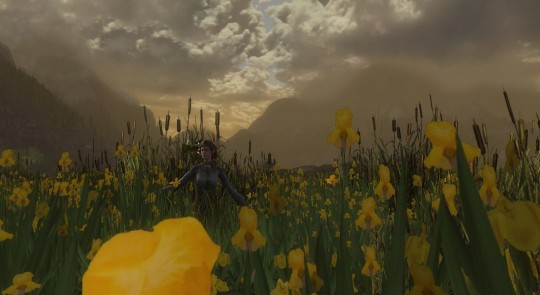
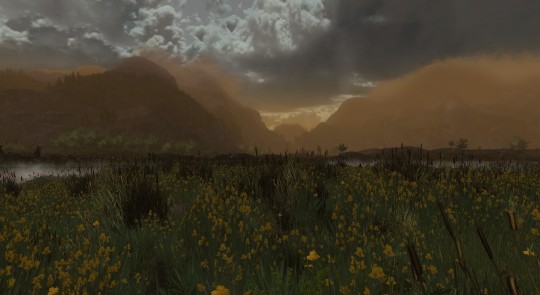
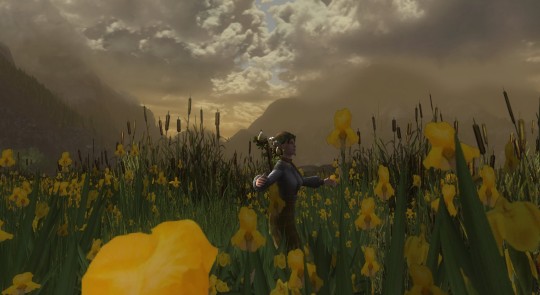
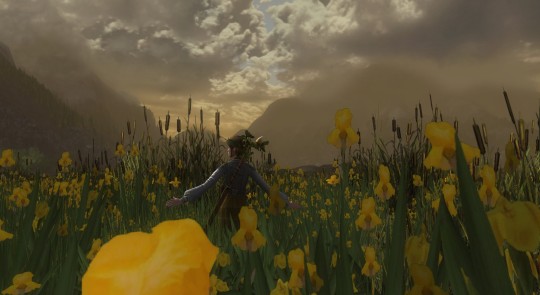
was just passing through the Vales of Anduin again, was stricken by the beautiful golden sunrise and galddens. Ethedis happened to be wearing an outfit that matched perfectly, so I couldn't resist a little photoshoot
#I really need to get reshade working again this would have looked so much prettier with it#lotro#lotro screenshots#lotro oc#ethedis
32 notes
·
View notes